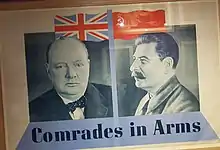Anglo-Soviet Treaty of 1942
The Anglo-Soviet Treaty, formally the Twenty-Year Mutual Assistance Agreement Between the United Kingdom and the Union of Soviet Socialist Republics, established a military and political alliance between the Soviet Union and the British Empire. The military alliance was to last until the end of World War II, whereas the political part of the treaty was to last 20 years.

The Treaty followed on from the Anglo-Soviet Agreement of July 1941 that they would assist each other in fighting Germany and not seek a separate peace.
The treaty was signed in London on 26 May 1942 by British Foreign Secretary Anthony Eden and Soviet Foreign Minister Vyacheslav Molotov.[1]
Background
The first meeting to discuss the treaty took place on 15 December 1941, a week after the United States had joined the British Empire and the Soviet Union to oppose the Axis powers.[2]
One of the goals of Joseph Stalin, the Soviet Union's head of government, was to establish a territorial agreement for a postwar Europe that would be largely divided between Britain and the Soviet Union.[2]
Stalin hoped to regain the territories that had been held by the Soviet Union, including Finland, Estonia, Latvia, Lithuania, Romania, Ukraine and Belarus before its losses during Operation Barbarossa, the German invasion of the Soviet Union, which began on 22 June 1941. In exchange, Britain would receive land and permission to have naval bases and maritime passage through the English Channel, the North Sea and the Baltic Sea. Britain made no commitments and Stalin's ideas did not form part of the agreement.[2]
Absence of most Allies
Absent from the discussions were the other Allies, including Australia, New Zealand, India and China, despite all of them having declared war on the Axis powers before 1941. Also not represented were the Allies that had governments-in-exile, such as Czechoslovakia and France, whose countries were being occupied by Germany, despite the Soviets' initial aim being to direct those countries' postwar structure.
Significance
The treaty represented a transition for Britain, which sacrificed some of its superpower status because of its weakened military state but still exerted diplomatic power during the negotiations.[3]
References
- Slusser, Robert M.; Triska, Jan F. (1959). A Calendar of Soviet Treaties 1917-1957. Stanford: Stanford University Press. p. 149.
- Plopeanu, Emanuel (2010). "Ankara – Stockholm – Bern: three types of press commentaries and interpretations about British – Soviet Treaty (May 1942)". Valahian Journal of Historical Studies (14): 133–142. ISSN 1584-2525.
- Kettenacker, Lothar (1982). "The Anglo-Soviet Alliance and the Problem of Germany, 1941-1945". Journal of Contemporary History. 17 (3): 436. JSTOR 260555.
External links
- Text of the treaty
- Molotov's Report on Ratification of the Anglo-Soviet Treaty
- George Ciorănescu, "The Problem of Bessarabia and Northern Bucovina During World War II", Radio Free Europe, 12 May 1981.